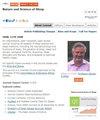Study on the Profiles of Sleep Disorders, Associated Factors, and Pathways Among Gynecological Cancer Patients – A Latent Profile Analysis
IF 3.4
2区 医学
Q2 CLINICAL NEUROLOGY
引用次数: 0
Abstract
Background: Gynecological cancer generally refers to malignant tumors in gynecology, commonly including cervical cancer, endometrial cancer, and ovarian cancer. Patients with gynecological cancer often suffer from sleep disorders after clinical treatment. Except for serious sleep disorders, female characteristics, family roles, and feudal beliefs make their self-stigma at a medium to high level, leading to huge pressure. This study aims to identify potential categories of sleep disorders, and analyze the relationship between self-stigma, perceived stress, and sleep disorders.Methods: A cross-sectional study was conducted in 2021– 2022. Two hundred and two patients’ data were collected from ShengJing Hospital Affiliated to China Medical University in Liaoning, Shenyang by using paper questionnaires for face-to-face surveys. The survey tools included the Pittsburgh Sleep Quality Index (PSQI), the Perceived Stress Scale (PSS), and the Social Impact Scale (SIS). Potential profile analysis (LPA), multiple logistic regression analysis, and structural equation modeling (SEM) were performed by Mplus 8.3, SPSS 26.0, and Amos 24.0 statistical tools, respectively.
Results: Three latent patterns of sleep disorders were found: “Good Sleep group (42.5%)”, “Sleep Deficiency group (32.4%)”, and “Sleep Disturbance group (25.1%)”. Patients with high perceived stress were more likely to report a moderate (OR=1.142, 95% CI: 1.061– 1.230) or high (OR=1.455, 95% CI: 1.291– 1.640) level of sleep disorders. Self-stigma did not have a direct effect on sleep disorders (0.055, P> 0.05), but it could have indirect effect on sleep disorders through perceived stress (0.172, P< 0.01).
Conclusion: The perceptions of sleep disorders among gynecological cancer patients varies and exhibits individual differences. Gynecological cancer patients who feels alienated or discriminated may cause high pressure. This internal pressure can exacerbate sleep disorders.
妇科癌症患者睡眠障碍概况、相关因素及路径研究--潜在概况分析
背景:妇科癌症泛指妇科恶性肿瘤,常见的包括宫颈癌、子宫内膜癌和卵巢癌。妇科癌症患者在临床治疗后往往会出现睡眠障碍。除了严重的睡眠障碍外,女性的特点、家庭角色、封建观念等使她们的自我成见处于中高水平,导致巨大的压力。本研究旨在确定睡眠障碍的潜在类别,并分析自我污名、感知压力和睡眠障碍之间的关系:方法:2021-2022 年进行了一项横断面研究。采用纸质问卷进行面对面调查,在辽宁沈阳的中国医科大学附属盛京医院收集了 2002 名患者的数据。调查工具包括匹兹堡睡眠质量指数(PSQI)、感知压力量表(PSS)和社会影响量表(SIS)。研究人员使用 Mplus 8.3、SPSS 26.0 和 Amos 24.0 统计工具分别进行了潜在特征分析(LPA)、多元逻辑回归分析和结构方程建模(SEM):结果:发现了三种潜在的睡眠障碍模式:"睡眠良好组(42.5%)"、"睡眠不足组(32.4%)"和 "睡眠紊乱组(25.1%)"。认为压力大的患者更有可能报告中度(OR=1.142,95% CI:1.061- 1.230)或高度(OR=1.455,95% CI:1.291- 1.640)睡眠障碍。自我污名对睡眠障碍没有直接影响(0.055,P> 0.05),但它可以通过感知压力间接影响睡眠障碍(0.172,P< 0.01):结论:妇科癌症患者对睡眠障碍的感知各不相同,并表现出个体差异。感到被疏远或歧视的妇科癌症患者可能会产生高压。这种内在压力会加剧睡眠障碍。
本文章由计算机程序翻译,如有差异,请以英文原文为准。
求助全文
约1分钟内获得全文
求助全文
来源期刊

Nature and Science of Sleep
Neuroscience-Behavioral Neuroscience
CiteScore
5.70
自引率
5.90%
发文量
245
审稿时长
16 weeks
期刊介绍:
Nature and Science of Sleep is an international, peer-reviewed, open access journal covering all aspects of sleep science and sleep medicine, including the neurophysiology and functions of sleep, the genetics of sleep, sleep and society, biological rhythms, dreaming, sleep disorders and therapy, and strategies to optimize healthy sleep.
Specific topics covered in the journal include:
The functions of sleep in humans and other animals
Physiological and neurophysiological changes with sleep
The genetics of sleep and sleep differences
The neurotransmitters, receptors and pathways involved in controlling both sleep and wakefulness
Behavioral and pharmacological interventions aimed at improving sleep, and improving wakefulness
Sleep changes with development and with age
Sleep and reproduction (e.g., changes across the menstrual cycle, with pregnancy and menopause)
The science and nature of dreams
Sleep disorders
Impact of sleep and sleep disorders on health, daytime function and quality of life
Sleep problems secondary to clinical disorders
Interaction of society with sleep (e.g., consequences of shift work, occupational health, public health)
The microbiome and sleep
Chronotherapy
Impact of circadian rhythms on sleep, physiology, cognition and health
Mechanisms controlling circadian rhythms, centrally and peripherally
Impact of circadian rhythm disruptions (including night shift work, jet lag and social jet lag) on sleep, physiology, cognition and health
Behavioral and pharmacological interventions aimed at reducing adverse effects of circadian-related sleep disruption
Assessment of technologies and biomarkers for measuring sleep and/or circadian rhythms
Epigenetic markers of sleep or circadian disruption.
 求助内容:
求助内容: 应助结果提醒方式:
应助结果提醒方式:


